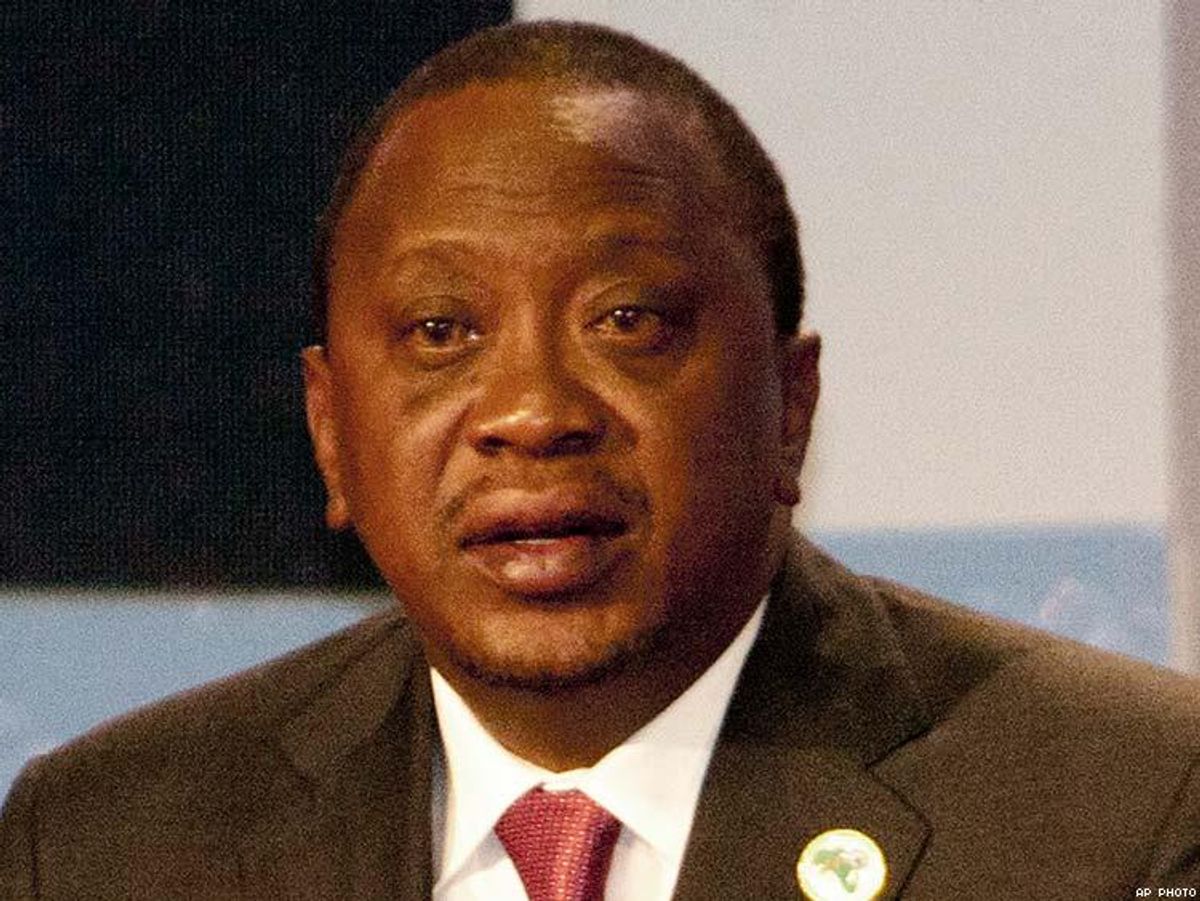Voices
Kenya's Reelected Leader Must End Horrifying Anal Exams

Will President Uhuru Kenyatta nudge his nation toward the future or keep it in the past?
Eric Gitari
August 10 2017 2:45 AM EST
October 31 2024 6:41 AM EST
By continuing to use our site, you agree to our Private Policy and Terms of Use.

Will President Uhuru Kenyatta nudge his nation toward the future or keep it in the past?
Kenya, the economic and political powerhouse of Eastern and Central Africa, held an election this week to choose the fifth president of the country since independence. While the vote is still being contested by opposition leader Raila Odinga, it appears that incumbent President Uhuru Kenyatta just won a second and final term. When it comes to defending the human rights of Kenya's LGBTIQ citizens, Kenyatta's record is critically important to our emerging democracy.
During President Obama's visit to Kenya in 2015, Kenyatta said, "We share a lot of things, but gay issues are not among them. ... There are some things that we must admit we don't share. It's very difficult for us to impose on people that which they themselves do not accept. This is why I say for Kenyans today the issue of gay rights is really a nonissue." Kenyatta was responding to Obama, who emphasized the need for Kenya to stop discriminating against gays and lesbians, saying, "I've been consistent all across Africa on this. When you start treating people differently because they're different, that's the path whereby freedoms begin to erode. And bad things happen."
During an interview with CNN in October 2015, Kenyatta underlined that what he meant when responding to Obama was not that gays have no rights. "I will not allow people to persecute any individuals, or beat and torture them," he said, adding that "we have to understand that these are processes and they take time ... and this is where I am saying we have to get synergies. You are not going to create the U.S., Great Britain, or Netherlands in Kenya, or in Nigeria or Senegal overnight."
President Kenyatta's lack of leadership on LGBTIQ issues is of great concern. The unsupportive public statements have offered license to state officers who continue to harass and arrest gays and lesbians; political cover to those who deny LGBTIQ citizens access to medical, educational, and other social services; and a justification for hate crimes committed by the general public. The use of forced anal exams to "prove" homosexual activity stands out as a particularly brutal form of torture in this larger context.
From 2015 to March 2017, senior state officers in Kenya have been encouraging police to use forced anal examinations on suspected gay men and trans women to prove the crime of private consensual homosexual adult sex, which is punishable with 14 years imprisonment. The outdated practice, which has so far been perfomed on two of our clients and has been used as a threat on others, involves a doctor inserting fingers or objects inside the rectum of a detainee, measuring the anus to assess indications of penetration, or even simply spotlighting the anus to check for bruises or tears. This practice, which has been upheld as valid by the High Court of Kenya, only serves to degrade and humiliate suspected gay men, since no further medical analysis is performed to prove the penetration was the result of consensual sexual activity by another man. These tests serve no evidentiary value in proving the crime of private consensual homosexual adult sex, and they have been denounced by medical and forensic athorities around the world.
In Africa, forced anal examinations on suspected gay men and trans women have been reported in Tanzania, Egypt, Tunisia, Uganda, and Cameroon. The African Commission on Human and Peoples' Rights noted in 2016 that forced anal examination constitutes torture. It has asked African states to respect Resolution 275 of the commission, which forbids violence and discrimination on the basis of real or imputed sexual orientation and gender identity. It also should be noted that Kenya has robust antitorture legislation, which defines torture to include the insertion of objects into sexual organs, including the anus. Unfortunately, there is little political will to extend the equal protection and equal benefits of such laws to gay men and trans women, who are now at risk of these forced anal examinations.
In this context, where there is no political will to enforce the law equally and where court appeals against the use of forced anal examinations languish in Kenyan courts, and with cases of blackmail, extortion, and detention of gay men and trans women on the rise, the National Gay and Lesbian Human Rights Commission of Kenya and the Council for Global Equality have asked the U.S. government to sanction those who are responsible for this barbaric practice. Together, we have lodged an application with the U.S. State Department under the Global Magnitsky Act to sanction senior Kenyan officers and medical professionals who are encouraging or performing forced anal examinations on suspected gay men and trans women, arguing that these practices amount to torture or cruel, inhumane, and degrading treatment. We hope the public discourse that the Global Magnitsky application brings will shine a spotlight on the cruelty of this procedure, highlighting the pointless and irreversible injury it causes to the dignity of the victim.
This is just one human rights issue that will determine Kenya's commitment to democracy and the rule of law. President Kenyatta will have to show leadership in ending this act of torture and many other forms of violence and discrimination against LGBTIQ citizens. He must also engage diplomatically to avoid sanctions against senior individual state officers and to uphold the international reputation of Kenya as a regional leader when it comes to democracy and equality.
ERIC GITARI is the executive director of the NGLHRC-Kenya and an LL.M. student at Harvard Law School.
Fans thirsting over Chris Colfer's sexy new muscles for Coachella